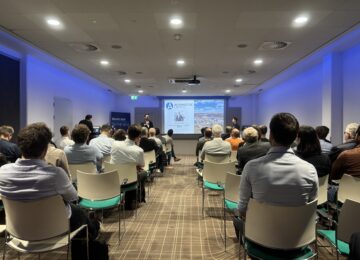No breakthrough for energy storage in Administrative Consultation
Energy Storage NL (ESNL) participated yesterday in an Administrative Consultation on Energy Storage led by outgoing Minister Jetten for Climate & Energy. This special consultation was convened at the intercession of ESNL and TenneT and was aimed at making a decision on the stimulation of energy storage, this since storage in the Netherlands is struggling to get off the ground financially. During the consultation it was decided to submit a time-dependent discount on transmission tariffs up to 65% on the high-voltage grid to the ACM.
Discount on transportation rates for storage
In the months leading up to the Administrative Consultation, ESNL met weekly with the Ministry of Economic Affairs, ACM, the grid operators and other stakeholders to explain the business case for electricity storage and to arrive at a workable financial solution. There was much attention paid to the high transmission tariffs. These tariffs, which are expected to continue to rise sharply in the coming years, can amount to more than 80% of the operational costs of large-scale battery projects. That is why Energy Storage NL, in cooperation with Energie-Nederland, has developed a proposal to treat energy storage on an equal footing with generators and thus have a zero transport tariff. Members of the ESNL 'Better Business Case' working group have provided ongoing input and input on the proposal.
In addition, TenneT has developed a proposal to apply a time-dependent tariff to all connected to the high-voltage grids. This could, depending on a system's charging and discharging behavior, amount to a discount of about 65% on tariffs. ESNL stresses that this is insufficient to finance energy storage and achieve 9 GW of flexibility by 2030, as named in TenneT's Adequacy Outlook. The proposal takes a first step for all connected parties but will not get energy storage off the ground in the Netherlands.
Problems rates remain, additional incentives needed
The Authority Consumer & Market (ACM) rejects a zero tariff for storage, because the ACM believes that through storage, use is made of the grid and that entails costs. With this argument, the consultations therefore decided to proceed with the TenneT proposal and reject a zero tariff. ESNL is critical of this decision, arguing that the use of storage will actually lead to a much more efficient electricity system and avoid additional investments, which will reduce overall grid tariffs instead of increasing them. We will therefore quickly conduct research with our members to demonstrate the benefits of storage in the electricity grid.
ACM and EZK have agreed to participate in this study and the consequences for cost reflectivity of tariffs. In addition, the minister will argue in Europe for a uniform policy framework for storage. EZK also intends to independently investigate the amount of storage that will actually be realized with the TenneT proposal. Earlier calculations based on market data by EnAppSys estimated that in the most optimistic scenario this would yield a feasible return towards 1.7 GW in 2030. Furthermore, the regional grid operators have pledged to come up with a proposal this year on how they intend to treat battery storage in the regional grids.
As long as the issue of tariffs applies, ESNL says other support measures to encourage energy storage in the context of security of supply should be urgently considered. In this context, the Ministry of Economic Affairs is investigating the pros and cons of a capacity mechanism and intends to inform the chamber about this in early 2024. We call on the ministry to enter into discussions with the industry as soon as possible on the best form. However, we do emphasize that subsidy does not offer permanent solutions.
Managing locations and amount of flex
Network operators want to get a better idea of the amount of flex needed in the Netherlands in the future. In April 2024, TenneT will present a new Security of Supply Monitor that will estimate the amount of flexibility needed and the expectations for this, including specifically for energy storage. The Monitor will be used to make adjustments should insufficient energy storage be realized. In addition, EZK wants to do an impact analysis for flexibility, including the share of energy storage, in the final National Energy Systems Plan.
Finally, location determination for energy storage projects was discussed. Although in principle this is left to local governments, the Ministry of Economic Affairs retains the possibility of using the National Coordination Regulation for battery projects over 100 MW. Such projects were designated of national importance in the Energy Main Structure Program. In this context, TenneT is conducting research into suitable locations in the grid for batteries and will deliver this in Q4 2023. Based on that research, the central and local governments and TenneT are working on a proposal around the desired spatial steering and division of roles, which should be delivered early next year. In addition, the grid operators have indicated that they are working with an external agency to provide more insight into their data on availability at the various locations in the grid. Before the end of the year, Netbeheer Nederland will clarify how they intend to proceed with this.
Zero tariff remains necessary for level playing field
Energy Storage NL is disappointed with the outcome of the Administrative Consultation and argues that the decision misses opportunities to invest in energy storage. TenneT's tariff proposal does not achieve a breakthrough and leaves an uneven playing field with Belgium, Germany, the United Kingdom, Ireland, Sweden, Finland, Spain and Italy, where solutions have been found. This carries the risk that investors and developers will leave for foreign countries where the business case is better. This is why ESNL continues to advocate for a zero tariff for energy storage. In addition, Energy Storage NL has asked the minister to advocate equal treatment of energy storage, including tariffs, at the European level. Outgoing Minister Jetten has promised to discuss this pentalaterally, including with Germany and Belgium.
The ACM has planned to assess the TenneT proposal for a time-dependent tariff on the high-voltage grids in February. In the formal procedure and consultations, we will continue to send the signal from the industry that more needs to be done to make storage a reality in the Netherlands.
Read ESNL's commitment to consultation in the publication below.





